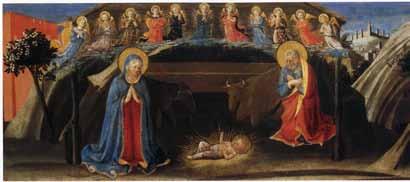
3 minute read
Christmas in the Nicene Creed
Homo factus est. “He became man.” God became man. The eternal Word–who was with the Father from all eternity, through whom all things were made and apart from whom nothing was made that is made–became man. The One who is God. Light of light, very God of very God, begotten not made, being of one substance with the Father. He became man.
Advertisement
On Christmas, He is in the arms of the Virgin. Completely God–begotten of His Father from all eternity. Completely Man–born of the Virgin Mary. He’s all yours: for you and for your salvation. That’s Christmas!

Every time the Lord’s Supper is celebrated, you confess this Christmas Gospel in the Nicene Creed: Homo factus est. “He became man.” God became man.
It’s a miracle that should probably cause you to pause for a second. Our sins caused God to become man. God did this to rescue you and me from all that we do, have done, and will do. This includes the evil that we are scared that we’ve done and the evil that we consider just a little sin. He took on our flesh to save us from it all.
Homo factus est. God became man to suffer under Pontius Pilate. He became flesh to be crucified, to die, and to be buried. This is what it took to save you: God becoming man.
Christ is born to die for you. He lives the life you should live before God and counts it as your life. Then He suffers for all your sins–past, present, and future. The just for the unjust. The holy for the godless. God dies. It’s unbelievable! But He does just that: He dies for your sins and for the sins of the whole world.
God became man. What an indescribable miracle! How amazing! How awe-inspiring! And when these words were said in the early Church, when that miracle was proclaimed, hats would come off and heads would bow in reverence. When homo factus est was said, every knee in the church would go down to worship Him. How could they not “come adore on bended knee, Christ the Lord the newborn king?”
You don’t have to drop to your knee at the words “He became man.” You are free to simply bow your head. It would be a good Christmas gift for those around you. With just a bow of your head you can communicate to them how important Jesus’ incarnation is to you and to them.
Homo factus est. “He became man.” For you, for me, for all, God has become man to save you from your sins. That’s a Merry Christmas in December! It’s also a Merry Christmas every time you say the Nicene Creed!
Pastor George Borghardt is the Senior Pastor at Zion Evangelical Lutheran Church in McHenry, Illinois. He also serves as the Conference and Deputy Executive of Higher Things.










